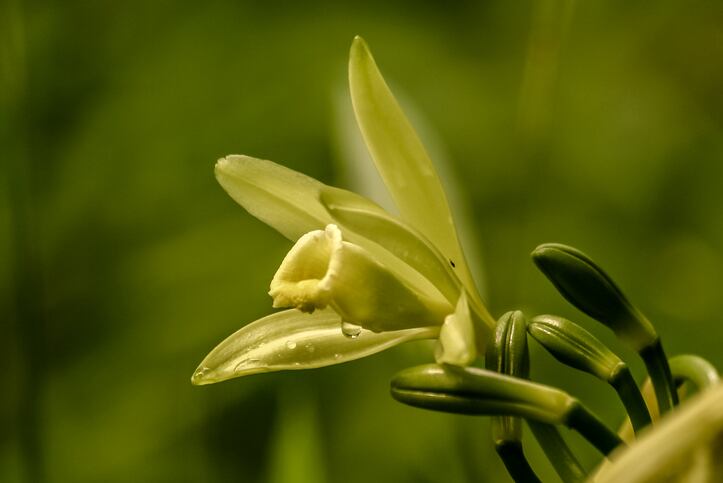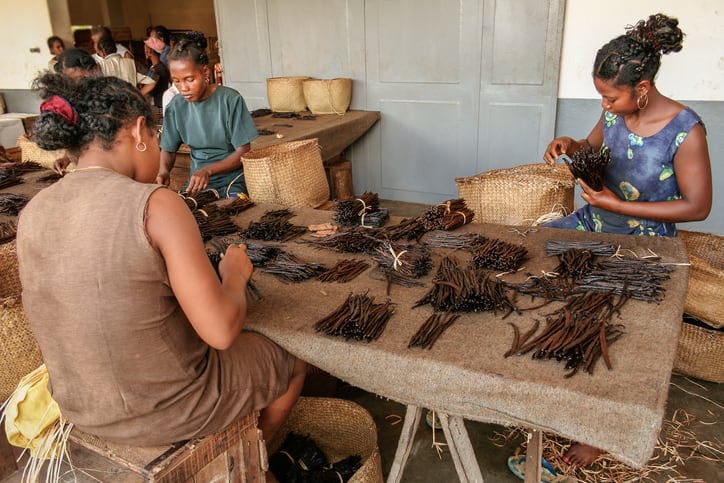“Our clients in Europe and North America are not switching: we see a sustained demand for natural vanilla extract. The market dynamics are still being driven by consumer preferences for [...] a picture of a natural Bourbon vanilla pod on pack,” global competence director for vanilla at Symrise Yannick Leen said.
However, with most of the world’s supply coming from cyclone-prone Madagascar, the natural vanilla market is notoriously volatile.
In March last year, cyclone Enawo devastated the island, killing at least 81 people - 18 were reported missing - and causing around $20 million of damage, according to a UN report. It hit the north-east Sava region first where most vanilla production is concentrated.
One of the biggest shocks, however, came from the 2003 cyclone which destroyed 90% of the crop and sent the price skyrocketing. This prompted food manufacturers to find cheaper alternatives, such as artificial vanilla flavours derived from wood or petrol, which in turn caused the price to plummet to between €20 and €60 per kilo.
This low price continued for a number of years with devastating consequences for Madagascan farmers who were dependent on the high value spice. Many switched to other crops.
Mintec: Current price is 'close to an all-time high'
According to Jara Zichra, senior market analyst at Mintec, Enawo caused prices to spike although they later stabilised because "some buyers resisted further price hikes" and production was not hit as badly as initially feared.
"However, prices still remain close to an all-time high," she added. As of January this year, Mintec puts it at $612.50 per kilo compared to just $25 per kilo in 2010.
The cyclone season is also still ongoing. “This is obviously something that no-one can predict or influence and can still impact volumes,” said Leen.
“We’ve also just had the flowering season where the orchid flowers need to be pollinated, and the peak of flowering this year was later. This means the beans will be mature at a later stage compared to previous years.”

Late peak flowering can be risky as farmers, who depend on vanilla for the bulk of their income, may be tempted to harvest the beans before they are fully mature.
The German supplier told FoodNavigator about the various strategies it has in place to weather these shocks.
It has been expanding its planting in Madagascar over a number of years as well as diversifying its sourcing to India and Indonesia. “With the pressure on market today, our plan is to react to that and expand souring outside Madagascar. We expect over the next few years our actions outside will increase.
“It’s also a story of developing Madagascar, and our strong [sustainability] project is the backbone of our sourcing,” said Leen.
‘A sustainable supply for a sustained demand’
While Symrise does not guarantee a minimum price for its farmers, it says it has other initiatives that help its some 6,000 farmers, of whom 5,600 were Rainforest Alliance or Fair Trade certified in 2017.
It subsidises elementary and agricultural schools and was involved in introducing a health insurance system in the Sava region.
Bonuses for high quality vanilla pods. Several factors impact the aromatic quality but a major one is the amount of time the pods mature on the vine.
“The bottom line is the longer you keep the beans on the vine the more mature and rich vanilla flavour you have.”
An interest-free rice credit system helps farmers eat during the pre-harvest hungry months and protect against early harvesting.
“This was a completely targeted initiative set up to solve this particular issue at this particular time. The farmers can benefit from these rice credits without any obligation to sell vanilla to Symrise.”

‘The problem is not just income but how cash is distributed over the year. Producers earn money over the summer months for vanilla so if they are mono-cropping, they have to save money for the rest of year. It’s about cash flow management.”
Symrise therefore provides agricultural inputs needed to diversify into other crops that are harvested at different times, such as cocoa, cloves, coffee and cinnamon.
Leen did not give specific numbers but said the firm was seeing indications that its sustainability programme was paying off.
“We see a decrease in the number of farmers using rice credits so that’s a good sign of self-sufficiency.”
It’s all about ensuring a stable, sustainable supply for a sustained long-term, demand.
And while Symrise also supplies artificial vanillin, popular especially in price-sensitive markets, the clean label trend in Europe has left its mark.
“Vanilla beans and extract also give a unique flavour fingerprint, which is why it’s so successful," Leen added. "It has a rich and long-lasting warm taste that is very difficult to mimic."
